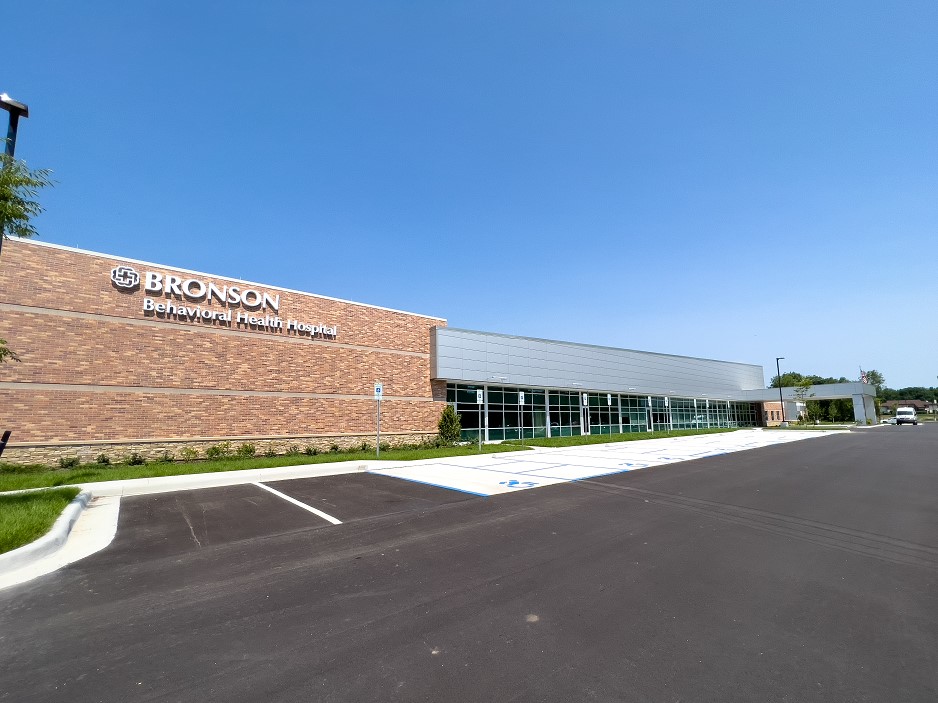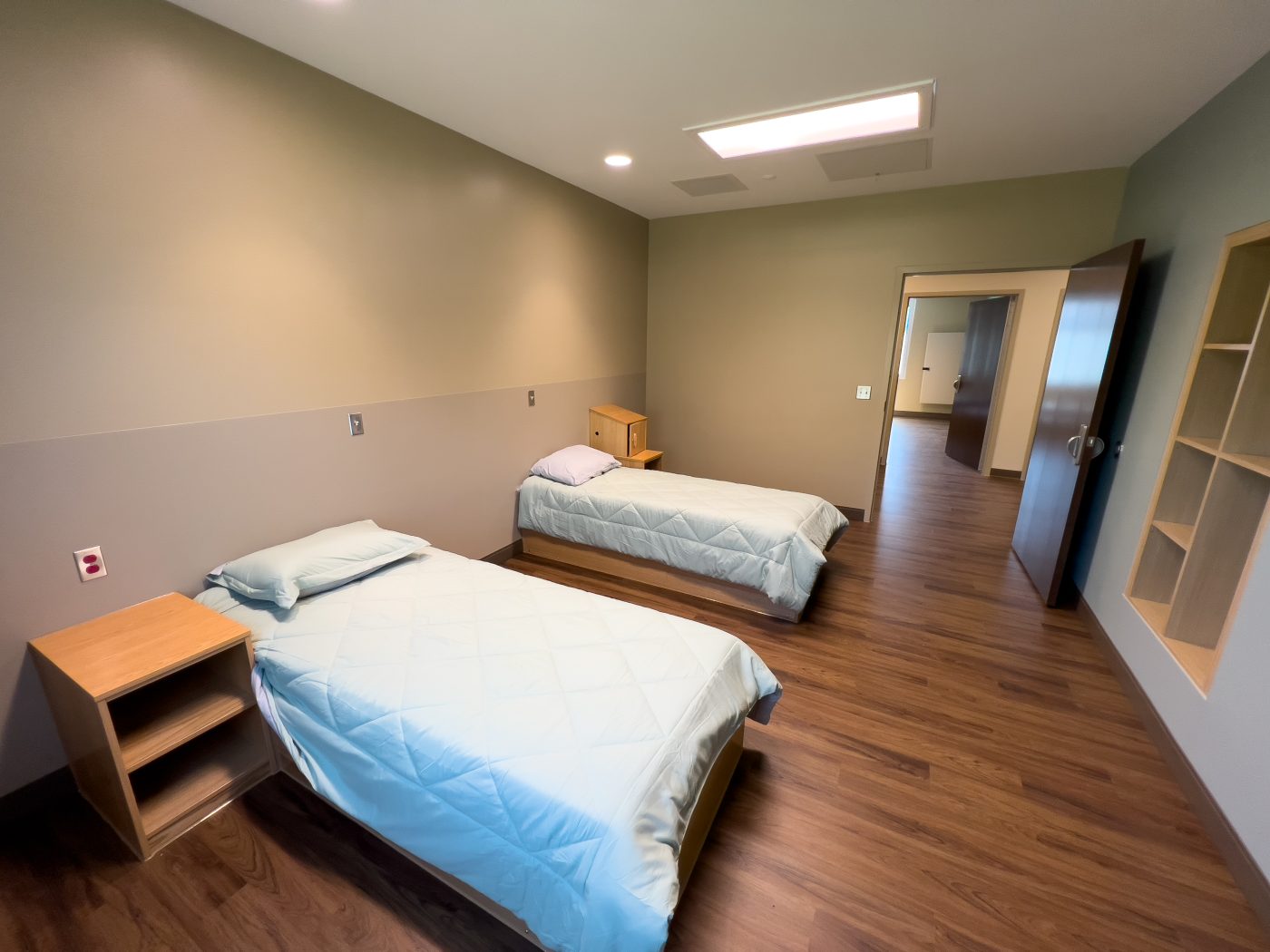Brief psychotic disorder is a mental health condition that is characterized by delusions, hallucinations, incoherent speech, and disorganized behavior. Someone who has brief psychotic disorder might experience these symptoms suddenly and for a short period of time. Depending on the severity of symptoms and how it impacts other areas of their life, someone who has brief psychotic disorder might benefit from receiving acute inpatient treatment.
An inpatient treatment program can help people who are struggling with brief psychotic disorder find stability and immediate care in a safe and secure environment. Inpatient care is especially important if someone has self-harming behaviors and suicidal thoughts as a result of the disorder.
At Bronson Behavioral Health Hospital, located in Battle Creek, Michigan, trained and compassionate behavioral health professionals are prepared to care for the acute needs of adults age 18 and older who have brief psychotic disorder. Our admissions staff is available to address your questions or concerns about inpatient care and how treatment can help you find lasting wellness.
Signs & Symptoms of Brief Psychotic Disorder
If someone experiences a sudden onset of impaired thinking, disrupted speech, and unusual behaviors, they may have brief psychotic disorder. During this episode, people may suffer from significant impairment in their ability to function. However, after the episode ends, most people who have brief psychotic disorder return to their baseline level of functioning and do not experience any further psychotic symptoms.
According to the fifth edition of the Diagnostic and Statistical Manual of Mental Disorders (DSM-5), someone who has brief psychotic disorder suffers from at least one of the following symptoms:
- Delusions: Delusions are false beliefs that are firmly held despite contrary evidence. These delusions may be paranoid or grandiose in nature, leading someone to have exaggerated beliefs about their abilities or believe that they are being spied on.
- Hallucinations: Hallucinations involve seeing, hearing, or feeling things that are not present.
- Disrupted speech: Someone who has brief psychotic disorder might have disruptions in their normal way of speaking. Their speech may be incoherent, illogical, and disorganized.
- Disorganized behavior: Someone who has brief psychotic disorder might display unpredictable and inappropriate behaviors that are not goal-directed or purposeful. People may exhibit unusual or bizarre movements, behave inappropriately in social situations, or have difficulty maintaining basic self-care.
- Catatonic behavior: Catatonic behavior involves an obvious decrease in activity and physical responsiveness. This symptom may include motionless behavior, rigidity, or repetitive, purposeless movements.
If you or someone you love is experiencing at least one symptom of brief psychotic disorder, we strongly encourage you to reach out for help. Prompt treatment is essential for mental health stabilization, especially if symptoms persist for longer than a month. An acute inpatient mental health treatment center can provide assessment and treatment in a safe environment. We understand how frightening or overwhelming the symptoms of brief psychotic disorder may feel, but you do not need to suffer alone. The team at Bronson Behavioral Health Hospital is here to help.
Brief Psychotic Disorder Risk Factors & Statistics
Brief psychotic disorder can affect people of all ages, genders, races, nationalities, and socioeconomic backgrounds. A 2022 article from the National Library of Medicine offers the following statistics on brief psychotic disorder:
- Populations that are under significant stress, like immigrants, refugees, and survivors of natural disasters, are more likely to suffer from brief psychotic disorder.
- The rate of brief psychotic disorder among people who live in developing countries is 10 times more than that of people who live in industrialized countries.
- Women are more likely than men to be diagnosed with brief psychotic disorder.
- People who have an existing mental health disorder are more likely to suffer from brief psychotic disorder.
According to the DSM-5:
- Brief psychotic disorder accounts for up to 7% of all first psychotic episodes requiring hospitalization.
- On average, the initial symptoms of brief psychotic disorder occur in adults who are in their mid-30s.
- More than 50% of people who have brief psychotic disorder have another psychotic episode after remission.
Researchers aren’t sure why some people suffer from brief psychotic disorder, but they believe that the disorder has roots in genetics, stressful life events, trauma, and environmental causes. An inpatient treatment center offers comprehensive therapy options so that people who have mental health concerns can find support and regain control of their lives.
Effects of Brief Psychotic Disorder
Brief psychotic disorder can significantly disrupt someone’s ability to function. The presence of delusions, hallucinations, and disorganized speech can make it challenging for people to perform day-to-day responsibilities and maintain relationships.
Effects of untreated brief psychotic disorder may also include:
- Emotional distress: The symptoms experienced during a psychotic episode can be distressing and confusing. Untreated brief psychotic disorder may lead to prolonged emotional distress, anxiety, fear, and agitation.
- Social isolation: Brief psychotic disorder symptoms can affect interpersonal relationships and lead to social isolation. Delusions and hallucinations may lead to mistrust and suspicion of other people. Disorganized speech or behavior can also create challenges in communication and social interactions.
- Occupational difficulties: Brief psychotic disorder can impact mental functioning and interfere with work performance. Difficulties with concentration, memory, and decision-making may result in reduced productivity or even loss of employment.
- Risk for self-harm and suicide: In some cases, brief psychotic disorder can lead to an increased risk for self-harming behaviors and suicidal thoughts. Delusions or hallucinations may drive people to engage in potentially dangerous activities that can harm themselves or others.
It is crucial to seek professional help if you are experiencing symptoms of brief psychotic disorder. Early intervention and treatment can help reduce emotional distress, prevent potential complications of the disorder, and promote remission. At Bronson Behavioral Health Hospital, our multidisciplinary team of mental health professionals provides comprehensive support and therapies that can help people improve their quality of life and achieve long-term healing.
Therapies Used in Brief Psychotic Disorder Treatment
At Bronson Behavioral Health Hospital, we strive to provide an environment that promotes restoration, peace, and stabilization. Our dynamic team of behavioral health professionals will work closely with you to develop a customized treatment plan of therapies that are designed for your specific needs.
Therapies in our acute inpatient treatment program may include:
- Individual therapy: Individual therapy sessions are guided by licensed social workers and licensed professional counselors. Counseling offers a private, confidential environment where you can process your emotions, learn healthy coping skills, identify stressors or triggers, and build self-esteem. By building a therapeutic relationship with a trained professional, you can learn how brief psychotic disorder symptoms impact your daily life and gain the skills needed to manage them.
- Family therapy: During your time in treatment, you may have the opportunity to participate in family therapy sessions. Symptoms of brief psychotic disorder can significantly impact and strain close relationships with family members. Family counseling can provide education about brief psychotic disorder so that family members can have a better understanding of the condition.
- Group therapy: Most patients participate in group therapy sessions at Bronson Behavioral Health Hospital each day. Group therapy is a valuable and effective form of treatment for brief psychotic disorder. Sessions are led by social workers, counselors, nurses, recreational therapists, and behavioral health technicians. These professionals guide discussions, promote a safe and welcoming environment, and encourage active participation. Group therapy provides an outlet for people to connect with others who are struggling with mental health concerns. Together, members of the group can learn emotion regulation, healthy coping skills, and life skills.
- Medication management: Patients have the opportunity to meet with a licensed psychiatrist who determines if medication is necessary for them. Trained and licensed mental health nurse practitioners, registered nurses, and licensed practical nurses are available to administer medications and provide comprehensive assessments.
At Bronson Behavioral Health Hospital, care is provided in a state-of-the-art, 96-bed treatment center in southwestern Michigan. Our diverse treatment team and various therapies are designed to support you during your healing journey.
Benefits of Inpatient Brief Psychotic Disorder Treatment
Inpatient treatment centers provide comprehensive and intensive care for people who are struggling with mental health concerns. Key benefits of inpatient treatment for brief psychotic disorder include:
- Stabilization of symptoms
- Medication management
- Individualized treatment plans
- Structured therapies
- Safe and supportive environment
- Multidisciplinary care
- 24/7 professional supervision
When symptoms of brief psychotic disorder are treated, people may experience improved functioning, better quality of life, and a decreased risk for harm to themselves or others. Inpatient treatment can help people regain control of their thoughts, emotions, and behaviors, allowing them to engage more fully in their personal and professional lives.
At Bronson Behavioral Health Hospital, we offer an accessible and supportive admissions process. Each patient receives a comprehensive assessment and a personalized care plan that guides them through treatment. After their time in treatment is complete, we provide each patient with a discharge plan that may include community resources, support groups, or recommendations for outpatient treatment.
There is help available for brief psychotic disorder. We encourage you to contact our admissions team today.
This content was written on behalf of and reviewed by the clinical staff at Bronson Behavioral Health Hospital.






